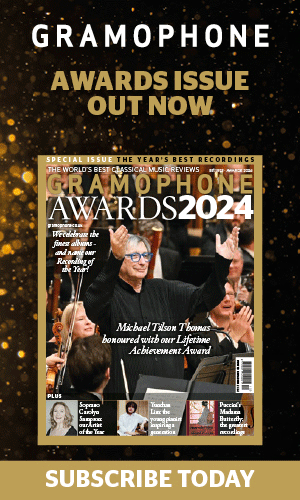Orchestral & Recording of the Year

WEINBERG Symphonies Nos 2 & 21
City of Birmingham Symphony Orchestra, Kremerata Baltica / Mirga Gražinytė-Tyla
(DG)
The Gramophone Review
The UK premiere of Symphony No 21 in Symphony Hall last November was a watershed moment for Weinberg’s reputation. It actually proved two things I wouldn’t have dared to predict: that one of his longest symphonies (55 minutes, six movements without a break, composed in 1991) could hold a full-size regular concert audience enthralled from first note to last, and that it could comfortably withstand the comparison with Shostakovich’s Fifteenth in the second half. The appearance of this performance on a major prestige label will surely prove one of the highlights of this, his centenary year.
The work has a multi-resonance back-story. It is dedicated to the victims of the Warsaw Ghetto, where Weinberg often said his parents and sister died (though where they actually perished is less than clear) and subtitled Kaddish after the Jewish prayer traditionally recited in memory of the dead. Its composition overlapped with his work on the film score to Boris Yermolaev’s Our Father, which tells of a Jewish mother and child who try to avoid consignment to the ghetto by wandering around the city at night in winter (including a church where the ‘Our Father’ is being intoned), but who are eventually found frozen to death and are unceremoniously thrown into the back of a truck. Weinberg took over the violin solos that accompany this appalling odyssey as one of the main thematic threads for the symphony, and his draft score shows that they derive from Mahler’s ‘Das irdische Leben’ (the setting of ‘Mother, mother, I am hungry; give me bread, or I shall die’ – in the Andantino section, the mother’s reply ‘Just you wait, just you wait’ is also cited, on a hollow-sounding xylophone). A wild imitation-klezmer ensemble, a sepulchral quotation from Chopin’s First Ballade (as painfully symbolic as the appearance of the same piece in Roman Polanski’s The Pianist), angelic soprano vocalises and several self-quotations from Weinberg’s own works complete the picture of a work heavily laden with semantic signposts.
‘Unsurprisingly, the depth and realism of DG’s recording are superb, and the all-important spatial distancing of the soloists in the Kaddish Symphony is beautifully captured’
Lest all of this be thought of as mere opportunistic audience-manipulation, it should be said that the connecting tissue of Weinberg’s music is remorselessly austere and artistically controlled, making the cumulative effect all the more profound. Not for him the glamour of Penderecki’s exercises in public compassion. And it is hard to see Weinberg’s 21st Symphony being co-opted for documentary purposes in the manner of Górecki’s Third (not Górecki’s fault, it should be said).
In takes a performance of fierce concentration and absolute dedication to ensure this music’s hold on an audience. The Siberian SO’s pioneer recording was a brave and noble venture but it is inevitably outclassed here. How could it not be, when the CBSO, with its newly appointed fireball Mirga Gražinytė-Tyla, is teamed up with Kremerata Baltica, lending extraordinary depth and power to the string sound and transforming passages in which the Siberians were clearly beyond full stretch into bursts of impassioned outrage. Add in Gidon Kremer – no less – for the violin solos, the conductor herself taking the soprano lines with a pure non-vibrato keening (the concert shared them rather awkwardly between a boy soloist and a concert soprano), and some superbly focused piano, clarinet and double bass solos, and you have an experience for which ‘compelling’ is scarcely an adequate description.
The neoclassical restraint and transparency of the 1946 Second Symphony, for strings alone, could hardly be further removed from all this raw lamentation and violence. Yet the juxtaposition serves to bring out affinities in the material (both works pick up from the Jewish-inflected Scherzo of the String Quartet No 4 of 1945). The Kremerata Baltica bring out even more subtleties of emotion than the superb but currently hard-to-get Moscow Chamber Orchestra and Barshai, eclipsing the worthy Swedish alternative, now back in the catalogue on Alto. Apart from her evident identification with the idiom, Gražinytė-Tyla has a terrific feel for the long structural-dramatic line, which brings not just new shades of detail but also an enhanced overall perspective to this piece.
The appearance of these two symphonies on an illustrious label is another clear pointer to Weinberg’s ‘arrival’. Unsurprisingly, the depth and realism of DG’s recording are superb, and the all-important spatial distancing of the soloists in the Kaddish Symphony is beautifully captured. All in all, this has to be one of the most important symphonic releases of the year.
(David Fanning, June 2019)
The Orchestral Award is sponsored by Medici TV
Listen on Apple Music

Gramophone Digital Club
- Digital Edition
- Digital Archive
- Reviews Database
- Full website access
From £8.75 / month
Subscribe
Gramophone Full Club
- Print Edition
- Digital Edition
- Digital Archive
- Reviews Database
- Full website access
From £11.00 / month
Subscribe
If you are a library, university or other organisation that would be interested in an institutional subscription to Gramophone please click here for further information.





